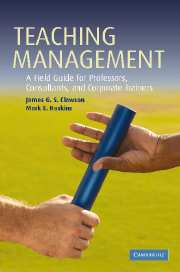Book contents
- Frontmatter
- Contents
- List of figures
- Sources to chapter quotations
- Why this book on teaching management?
- 1 Fundamental elements in teaching
- 2 Levels of learning: one, two, and three
- 3 Adult learning theory: it matters
- 4 Planning a course: trips and tips
- 5 Planning a class: no detail is too small
- 6 Lecturing: the possibilities and the perils
- 7 Managing discussions
- 8 Case method: fostering multidimensional learning
- 9 Role-playing
- 10 Case writing: crafting a vehicle of interest and impact
- 11 Case teaching notes: getting from here to there
- 12 Action learning
- 13 Experiential methods
- 14 Enhancing the conversation: audiovisual tools and techniques
- 15 Executive education: contributing to organizational competitive advantage
- 16 Using technology to teach management
- 17 Counseling students
- 18 Evaluating students: the twin tasks of certification and development
- 19 Teaching evaluations: feedback that can help and hurt
- 20 Research presentations
- 21 Managing a degree program: behind the ‘glory’
- 22 Managing a nondegree client program: an overview
- 23 Dealing with the press
- 24 Managing yourself and your time
- 25 Using teaching portfolios and course portfolios
- 26 Conclusion: is this on the exam?
- Index
24 - Managing yourself and your time
Published online by Cambridge University Press: 25 February 2010
- Frontmatter
- Contents
- List of figures
- Sources to chapter quotations
- Why this book on teaching management?
- 1 Fundamental elements in teaching
- 2 Levels of learning: one, two, and three
- 3 Adult learning theory: it matters
- 4 Planning a course: trips and tips
- 5 Planning a class: no detail is too small
- 6 Lecturing: the possibilities and the perils
- 7 Managing discussions
- 8 Case method: fostering multidimensional learning
- 9 Role-playing
- 10 Case writing: crafting a vehicle of interest and impact
- 11 Case teaching notes: getting from here to there
- 12 Action learning
- 13 Experiential methods
- 14 Enhancing the conversation: audiovisual tools and techniques
- 15 Executive education: contributing to organizational competitive advantage
- 16 Using technology to teach management
- 17 Counseling students
- 18 Evaluating students: the twin tasks of certification and development
- 19 Teaching evaluations: feedback that can help and hurt
- 20 Research presentations
- 21 Managing a degree program: behind the ‘glory’
- 22 Managing a nondegree client program: an overview
- 23 Dealing with the press
- 24 Managing yourself and your time
- 25 Using teaching portfolios and course portfolios
- 26 Conclusion: is this on the exam?
- Index
Summary
I wish I could stand on a busy corner, hat in hand, and beg people to throw me all their wasted hours.
– Bernard BerensonTeaching careers have many wonderful features. We get to spend our lives studying things we want to study, working with bright young people whose lives we can influence and edify; we have enormous freedom over the way we spend our time; we often have immediate access to excellent physical fitness facilities at reduced rates, and we have a summer schedule that can be adapted to meet our own needs. The corollary in the corporate world may not have quite as much summertime freedom, nevertheless most of the other benefits still apply. The job of teaching business management has great variety: We alternately act as teachers, researchers, writers, counselors, administrators, consultants, expert witnesses, representatives, and public speakers. Personally, we are hard-pressed to imagine a more rewarding, worthwhile, stimulating profession.
These same features, though, can be overwhelming. The work is never done, it is hard to leave it at the office, students come and go, making it easy to lose sight of their individual growth and development. Pressed by the desire or the demand to publish and/or design the next dynamite class or program, we often work long hours and ignore other dimensions of life. The university tenure system places heavy pressure on young faculty to produce or face the prospect of being let go. Peopled by self-confident and independent individuals, the ranks of academe and corporate training departments are often rife with political battles and unfortunate jealousies of fame and fortune.
Information
- Type
- Chapter
- Information
- Teaching ManagementA Field Guide for Professors, Consultants, and Corporate Trainers, pp. 454 - 461Publisher: Cambridge University PressPrint publication year: 2006
